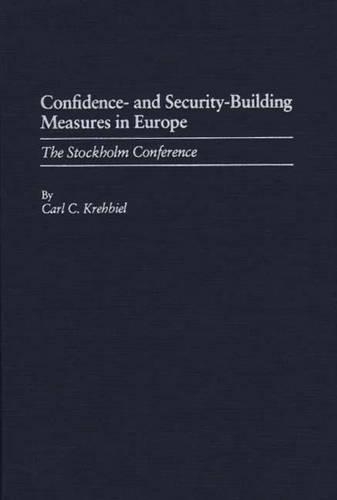
Confidence- and Security-Building Measures in Europe: The Stokholm Conference
(Hardback)
Publishing Details
Confidence- and Security-Building Measures in Europe: The Stokholm Conference
By (Author) Carl Kreehbiel
Bloomsbury Publishing PLC
Praeger Publishers Inc
11th October 1989
United States
Classifications
Tertiary Education
Non Fiction
327.174
Physical Properties
Hardback
399
Description
This volume examines in detail the major proposals for confidence- and security-building measures that were made at the Conference on Disarmament in Europe (CDE) held in Stockholm during 1984-86. The CDE produced an historic agreement which included the first provision ever negotiated for on-site inspection on demand. Focusing on major proposals made by NATO, the Warsaw Pact, and the neutral and non-aligned nations, the author also evaluates the effects, if adopted, these measures would have in the real world. Providing a unique insider's account of positions taken, he lets the reader draw conclusions about the actual goals of each of the participating groups--reduction of military tensions or propaganda. This book gives the reader an insider's view of a major international security negotiation and unique insight into the positions of participating nations. Some view the act of reaching agreement as the most significant aspect of the Stockholm Conference. According to this author, it is in fact the content of the CDE agreement that matters. Following a brief review of the background to the CDE, Krehbiel concentrates on a detailed analysis of the major proposals in the areas of notification, information, observation, constraints, and verification. The final two chapters evaluate the resulting agreement, its strengths and weaknesses, and its potential to accomplish CDE goals. The book concludes with a brief assessment of its implementation.
Reviews
. . . it is difficult not to agree with Krehbiel's conclusion that "the NATO proposal . . . was by far the best" (p. 303). The Soviet attitude in Stockholm was marked by posturing and disingenuousness, and Krehbiel's account reminds us how difficult it was to deal with the Kremlin in the pre-glasnost era. . . . Whatever present decision makers believe, they would benefit from reading Krehbiel's interesting book.-Political Science Quarterly
." . . it is difficult not to agree with Krehbiel's conclusion that "the NATO proposal . . . was by far the best" (p. 303). The Soviet attitude in Stockholm was marked by posturing and disingenuousness, and Krehbiel's account reminds us how difficult it was to deal with the Kremlin in the pre-glasnost era. . . . Whatever present decision makers believe, they would benefit from reading Krehbiel's interesting book."-Political Science Quarterly
Author Bio
CARL C. KREHBIEL a career Army officer, is currently assigned as an adviser on arms control to the Supreme Allied Commander Europe (SACEUR), at the headquarters of Allied Command Europe (SHAPE), Belgium. He has served in a wide variety of political-military, arms-control, and intelligence assignments, ranging from Vietnam to the Green Berets.
